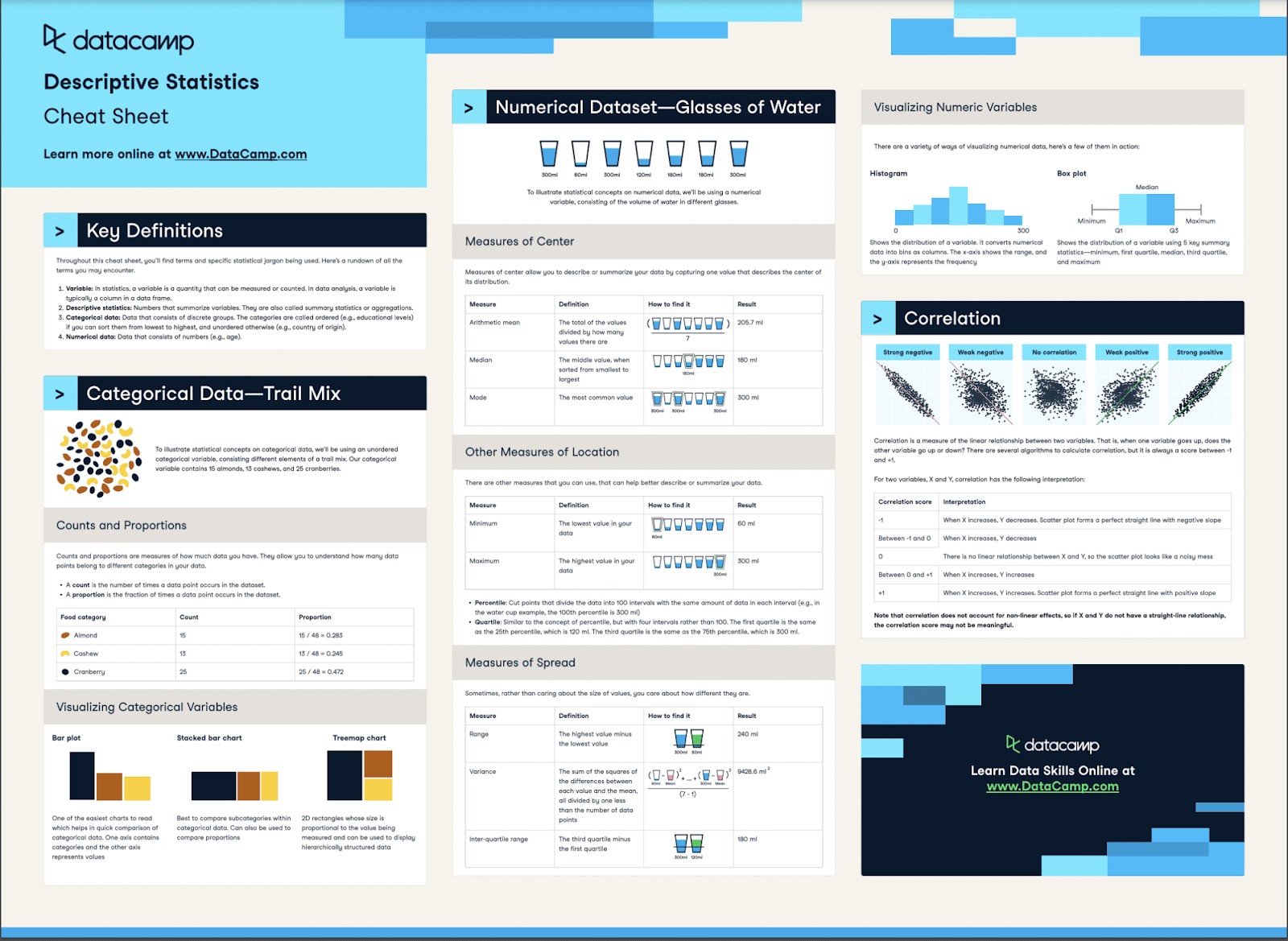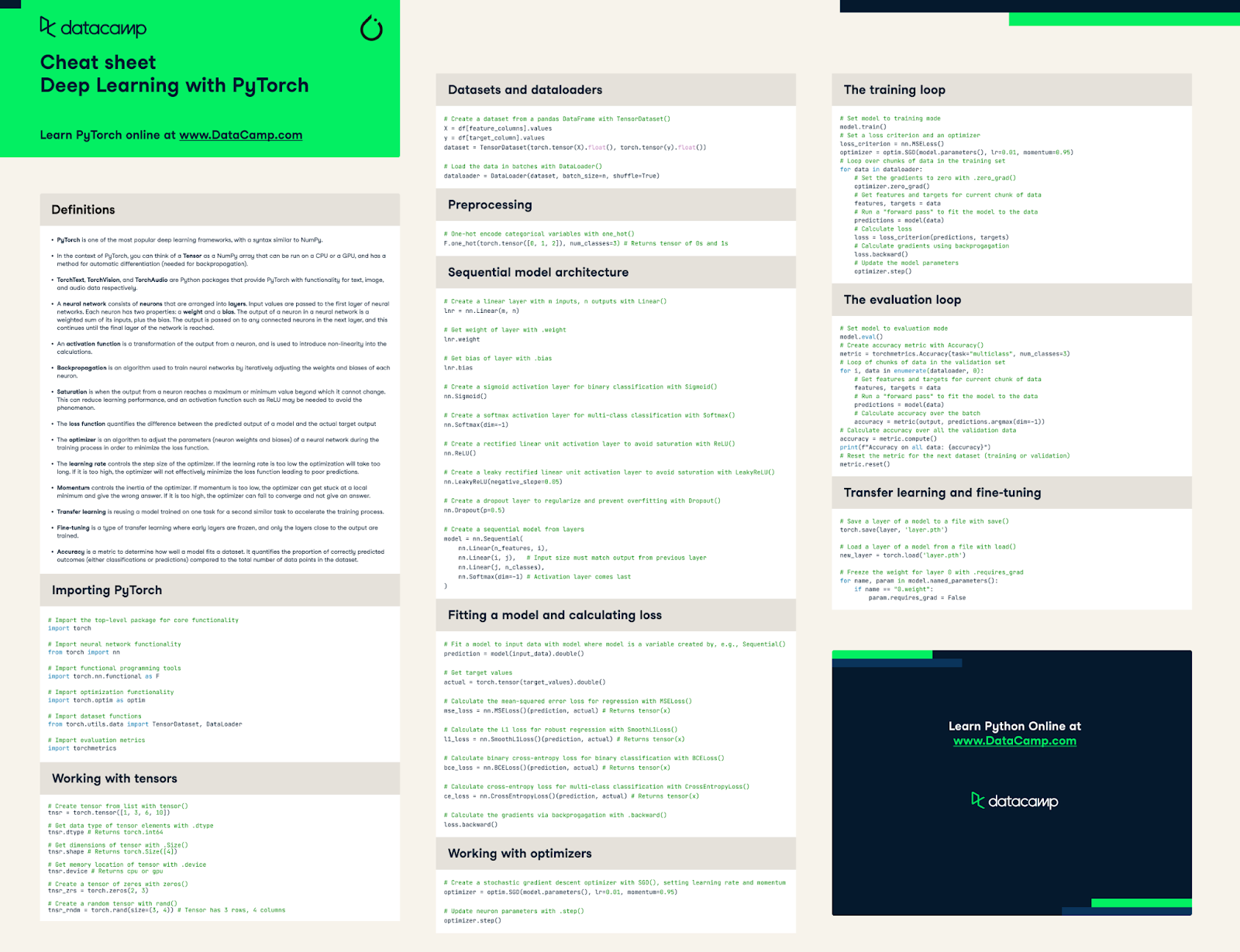Track
With jobs that require specialist AI skills growing 3.5 times faster than all jobs, the role of AI engineer is one that's likely to be in high demand for years to come.
But what are the skills used by an AI engineer, and what should you learn if you plan to become one?
In this article, we'll provide an overview of the top 14 essential AI engineer skills that you need to know.
Developing skills in AI engineering is crucial for implementing machine learning systems. So, if that's what you're interested in, do read on! If you’re looking to learn AI from scratch, check out our separate guide.
Develop AI Applications
What is an AI Engineer?
AI engineers are responsible for designing, developing, and maintaining AI-based systems. They use their skills in machine learning, programming, data analytics, and other technologies to create intelligent applications that can learn from data and make decisions.
AI Engineer Technical Skills
To better understand the role of an AI engineer, let's look at the technical skills they typically possess:
1. Programming languages
As it goes without saying, an AI engineer needs to be proficient in programming languages.
Some of the commonly used languages for AI development include:
- Python
- Java
- R
- C++
- JavaScript
Python
Python is especially popular due to its easy-to-learn syntax and extensive libraries for AI and machine learning. Knowledge of these languages is crucial for developing algorithms, implementing models, and working with data.

Increase in use of Python over the years - Source
This has led to its increase in popularity over the years, according to the TIOBE index.
Libraries such as TensorFlow, Keras, and PyTorch are commonly used in Python for AI development. TensorFlow 2.13 introduced improved support for TensorFlow Lite, making deployment on edge devices more efficient. PyTorch 2.0 introduced advancements in dynamic computation graphs, enhancing performance and flexibility. Hugging Face’s Transformers library has also gained popularity for integrating generative models like GPT-4 and LLaMA. Use cases include predictive analytics, natural language processing, and image recognition
Start learning today with our Python Programming track.
Want to use PyTorch for deep learning? Kick-start your learning using our cheat sheet below.
Our Deep Learning with PyTorch Cheat Sheet
R
R language, primarily used for statistical analysis and graphics representation, is also frequently used in AI.
The 'caret' package in R aids in predictive modeling, while 'e1071' simplifies the process of creating a machine learning model. R finds its use in AI projects related to scientific research, healthcare, finance, and social media analytics.
We have an R Programming skill track, which will teach you how to code like a programmer from scratch.
Java
Java is another popular choice in AI development, mainly due to its simplicity, readability, and excellent user interaction capabilities.
Its strong memory management and the breadth of high-quality machine learning libraries, such as Stanford Library NLP and Apache Open NLP, make it suitable for chatbot development.
Use cases include chatbots, website recommendation systems, and fraud detection in the finance sector. You can get started with our Introduction to Java course.
If you plan to use the OpenAI API for chatbot development, take a look at our course on Working with the OpenAI API.
C++
C++ provides the ability to execute high-level applications with a relatively low computational cost, making it suitable for machine learning and neural network computation.
Libraries like Shark and mlpack are designed for machine learning in C++. AI use cases include computer vision tasks, robotics, and gaming. Check out our tutorial on Llama.cpp to learn how C++ is used with the LLaMa LLM.
2. Data modeling & engineering
Data is the foundation of AI, and AI engineers need to have a deep understanding of data modeling and engineering.
They should know how to acquire, clean, and transform data into a suitable format for analysis. Knowledge of SQL and NoSQL databases is essential for querying and managing large datasets.
Tools such as Apache Spark, Hadoop, AWS S3, and DuckDB are also commonly used for data processing in AI projects.
3. Big data analysis
AI engineers should be able to analyze large sets of data and extract meaningful insights from them. This involves using big data tools such as SparkSQL, Apache Flink, Apache Arrow, and Google Cloud Platform to query and manipulate large datasets.
Our big data fundamentals with PySpark course covers many of the principles behind big data analysis, making it a perfect starting point for you to learn.
4. Machine learning models
Knowledge of machine learning models and algorithms is a must for AI engineers.
This includes understanding supervised and unsupervised learning techniques, as well as deep learning algorithms such as convolutional neural networks (CNNs) and recurrent neural networks (RNNs).
AI engineers should also know how to evaluate the performance of these models using metrics like
- Accuracy
- Precision
- Recall
- Root-mean-square deviation (RMSE),
- Mean absolute error (MAE)
- F1 score
Our Machine Learning Fundamentals with Python skill track can help you learn many of the basics of machine learning.
5. AI and ML services
AI engineers should also be familiar with cloud-based AI and machine learning services offered by major providers such as AWS, Azure, and Google Cloud Platform. AWS’s Bedrock now offers managed foundational models, and Google’s Vertex AI has added features simplifying the deployment of large language models. These services provide pre-built models, APIs, and tools for developing intelligent applications without the need for extensive coding. Additionally, the rise of low-code/no-code AI platforms like Microsoft Power Platform and Google AutoML has made AI development more accessible to those without extensive programming backgrounds. Check out our AWS, Azure and GCP Service Comparison cheat sheet for more details.
6. AI Deployment & DevOps
Deploying AI applications involves collaborating with DevOps teams to ensure smooth integration and deployment.
AI engineers should know how to use tools such as Docker and Kubernetes for containerization, configuration management, and orchestrating deployments.
They are also responsible for monitoring and maintaining the performance of AI systems post-deployment.
Our Introduction to Docker course provides a good foundation to start with, and you can find out more about Docker certification in a separate article.
For guidance on how to implement AI, you can check out our course on Implementing AI Solutions in Business.
7. AI security
Understanding and implementing strong data security and privacy measures is crucial for any AI engineer, as AI applications bring new security vulnerabilities.
As an AI engineer, it is your responsibility to ensure the confidentiality, integrity, and availability of the data you handle.
This involves understanding regulations related to data protection, such as the General Data Protection Regulation (GDPR), and implementing secure AI frameworks that comply with these regulations.
Additionally, AI engineers must be knowledgeable about various encryption methods, secure AI model development practices, and be prepared to handle potential security attacks or breaches.
Some techniques used by AI engineers include:
- Multi-party computation for secure data sharing
- Differential privacy to protect individual data points
- Homomorphic encryption for secure computations on encrypted data
Some tools used for securing AI applications include:
- AWS Identity and Access Management: a service that enables you to manage access to AWS resources securely
- TensorFlow Privacy: a library that facilitates the development of secure and privacy-preserving machine learning models.
To help you get started, I would recommend having a look at Google’s Secure AI Framework.
Popular AI Libraries and Their Use Cases
The table below provides a quick reference showing the variety of libraries available for different AI tasks, helping you decide which tools might be best suited for your AI engineering aspirations.
| Library | Programming Language | Use Cases |
|---|---|---|
| TensorFlow | Python, C++ | Deep learning, neural network training, image recognition, natural language processing, and more. |
| PyTorch | Python | Deep learning, neural network development, computer vision, NLP, and reinforcement learning. |
| scikit-learn | Python | Classical machine learning algorithms, data preprocessing, model evaluation, and clustering. |
| Keras | Python | Simplified deep learning, neural network architectures, prototyping, and research. |
| OpenCV | C++, Python | Computer vision tasks such as image processing, object detection, and facial recognition. |
| NLTK | Python | Natural language processing tasks including tokenization, stemming, and text classification. |
| spaCy | Python | Industrial-strength NLP library for tasks like named entity recognition, part-of-speech tagging. |
| Apache MXNet | Python, Scala | Scalable deep learning, model training, deployment on various devices, including mobile and edge. |
| Caffe | C++, Python | Convolutional neural networks (CNNs) for image classification and deep learning research. |
| Gensim | Python | Topic modeling, document similarity analysis, and word embedding. |
| Theano | Python | Deep learning research, mathematical operations on multi-dimensional arrays. |
| H2O.ai | Java, R, Python | Scalable machine learning, data analysis, and predictive modeling for enterprise applications. |
| Apache Mahout | Java, Scala | Scalable machine learning algorithms for classification, clustering, and collaborative filtering. |
Non-Technical Skills for AI Engineers
Apart from technical skills, AI engineers should also possess certain soft skills to excel in their roles. These include:
8. Communication and collaboration
AI engineers need strong communication skills to effectively communicate complex AI concepts and ideas to non-technical stakeholders.
Moreover, as AI projects are often team efforts, collaboration is essential for efficient project execution.
You'll likely be in constant meetings with other tech, such as:
- Data scientists, to discuss model development and optimization
- Data analysts, to understand data requirements for AI projects
- Software developers, for integration of AI models into existing systems
- Project managers, to ensure timely and successful project delivery
9. Adaptability and continuous learning
The field of AI is constantly evolving, with new tools, techniques, and advancements emerging all the time.
Therefore, AI engineers must be adaptable and willing to continuously learn to stay up-to-date with the latest developments in the field.
10. Critical thinking and problem-solving
The ability to think critically and solve complex problems is vital for AI engineers.
AI projects often involve working with large datasets, developing sophisticated algorithms, and troubleshooting issues that arise during model development or deployment.
11. Domain knowledge
Having domain knowledge in your specific area of focus can give you an edge as an AI engineer.
For example, if you work on healthcare-related AI projects, having a strong understanding of the healthcare industry and its challenges can help you develop more effective solutions.
Similarly, if you work on financial AI projects, having a background in finance or economics can be beneficial.
Advanced Skills for AI Engineering
12. Advanced mathematics and algorithm knowledge
Advanced mathematics, such as linear algebra, calculus, and statistics, are essential for understanding AI algorithms and techniques.
Here’s a statistics cheat sheet to help you get started:

Our Descriptive Statistics Cheat Sheet
AI engineers should also know how to develop custom algorithms based on these mathematical models to solve unique problems.
Our Statistics Fundamentals with Python course helps you develop some of the essential skills if you're new to the space.
13. Neural network architectures
Understanding and applying neural networks in AI solutions is a critical skill for AI engineers.
This involves knowing the different types of neural networks, such as convolutional neural networks (CNNs) and recurrent neural networks (RNNs), their applications, and how to implement them.
Some tools used for developing neural network architectures include:
- TensorFlow: an open-source library for building and training neural networks
- Keras: a high-level API that runs on top of TensorFlow to simplify the process of building, testing, and deploying deep learning models
14. Generative AI models and reinforcement learning
AI engineers should also focus on understanding generative AI models like GPT-4, Stable Diffusion, and LLaMA, which are transforming fields like text generation, art creation, and more. Additionally, reinforcement learning—used in applications such as robotics and game AI—is becoming increasingly important.
Where to Learn AI Engineer Skills
To start building up on all these skills, you can start with:
1. Work on projects
If you are already working in a tech-related role, look for opportunities to collaborate with AI teams or work on AI projects. This will give you hands-on experience and help you understand the specific skills required for AI engineering.
Additionally, I would recommend looking at some machine learning projects that involve deep learning as well.
2. Online courses and tutorials
There are plenty of online courses and tutorials available that cover various AI engineering skills. We’ve already linked to many of these throughout the article, but if you're interested in getting started, check out our AI Fundamentals Skill Track.
3. Attend AI conferences and workshops
Attending AI conferences and workshops can give you a chance to network with other professionals in the field, learn about new tools and techniques, and gain valuable insights into industry trends.
For webinars, check out this one on Designing Data & AI Products. For a full conference, you might like our RADAR AI conference.
4. Read industry publications
Staying updated on the latest developments in the AI industry is crucial for AI engineers.
You can source them from resource portals like:
- arxiv: a free online repository of research papers in various fields, including artificial intelligence and machine learning.
- MIT Technology Review: a magazine focused on emerging technologies and their impact on society.
Wrapping Up
AI engineering is a rapidly growing field with immense potential for those who possess the necessary skills and knowledge.
With the right combination of technical and non-technical skills, you can excel in this role and contribute to advancing groundbreaking AI solutions.
Thinking of picking up these AI engineer skills for yourself? To get started in the field of AI, check out our AI Fundamentals Skill Track or selection of AI Tutorials.
Earn a Top AI Certification

I'm Austin, a blogger and tech writer with years of experience both as a data scientist and a data analyst in healthcare. Starting my tech journey with a background in biology, I now help others make the same transition through my tech blog. My passion for technology has led me to my writing contributions to dozens of SaaS companies, inspiring others and sharing my experiences.



